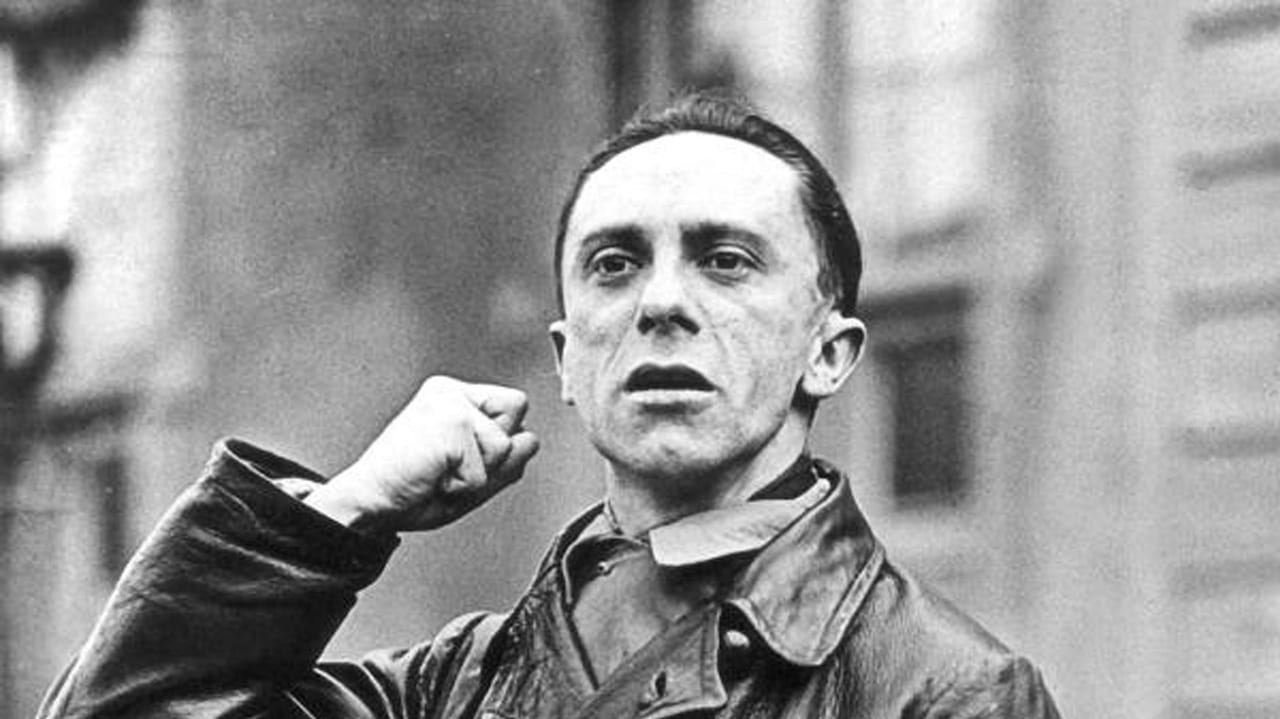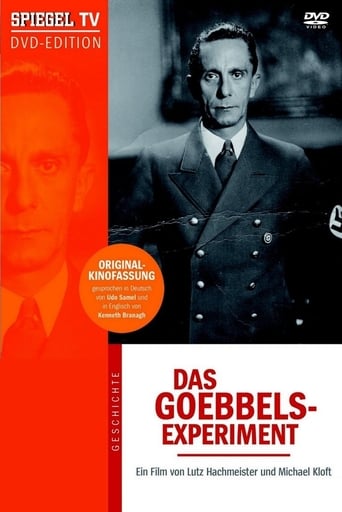

Dreadfully Boring
... View MoreThe film makes a home in your brain and the only cure is to see it again.
... View MoreA film of deceptively outspoken contemporary relevance, this is cinema at its most alert, alarming and alive.
... View MoreThis movie tries so hard to be funny, yet it falls flat every time. Just another example of recycled ideas repackaged with women in an attempt to appeal to a certain audience.
... View MoreEveryone once in a while a film comes along that people need to see. This is especially true concerning events of global consequence, Nazi Germany most specifically. And while films such as Schindler's List are invaluable in personalizing the tragedy of millions, they are emotionally based, as they should be. But what "The Goebbels Experiment" does is that it makes us think about why and how one man (and so many others) could come to bring about and participate in atrocities. The film doesn't talk much about the nature of the propaganda itself -- it's not a legit documentary about Goebbels, but a strict series of readings from his diaries -- but to hear Goebbels talking, we can hear echoes of the terrible propagandists that have brought about so much disaster in the years since. There is much to be learned from this film, particularly in seeing up close what could make a human being into a monster. It happens easier and more often than you'd think, and this film, while sometimes a bit dull and one-dimensional, does accomplish that purpose. You don't have to be an expert on World War II or Nazi Germany to appreciate the film, but it does help provide contextual understanding. I think this is a worthwhile film along the lines of any film about the Third Reich; the lessons must be learned, and the intervening years have proved just how much we have failed to learn them.
... View MoreSPOILER: The Nazis lose World War Two.For my quids, Paul Joseph Goebbels was far and away the most interesting and complicated of the Nazi leaders. Goering and Himmler were motivated purely by self-interest; so was Speer, but he was also caught up in Hitler's cult of personality. Goebbels, on the other hand, was no mere stooge. He was an accomplished playwright and poet, who was committed to the National Socialist cause even before Hitler emerged as that cult's leader. In the diary which Goebbels kept from the 1920s until shortly before his death, he frequently questioned Hitler's leadership, and wondered if the movement was travelling the wrong way. (I'm astounded that Goebbels saved those diary entries after Hitler had consolidated his power.) Goebbels married a beauty queen, had six children off her, and juggled simultaneous affairs with multiple mistresses ... quite different from his boss Hitler, who was terrified of physical intimacy. If Goebbels had been the head Nazi, things might have ended very differently.The simple but riveting film 'The Goebbels Experiment' is constructed round a brilliant idea. Silent newsreel footage — depicting the rise of the Nazi movement, the Third Reich, its glorious zenith and then its inglorious downfall — is shown on screen while Kenneth Branagh reads entries from Goebbels's diaries in chronological order, making no attempt to 'perform' the text as a dramatic role. Goebbels's chilling words speak for themselves.For me, the most startling moment in this documentary occurred early on, when the Nazi party have successfully manipulated Germany's national election, becoming the duly-elected political force ruling Germany. When this happens, Goebbel openly exults (as did Hitler), saying that the last time he felt this excited was when the Kaiser declared war in 1914. I quite believe that Goebbels sincerely felt this way, but I was pulled up short by it ... because Germany's adventure of 1914 turned out to be a huge mistake, bankrupting the nation and destroying its national currency, as well as toppling the German royal family and humiliating the nation.Did Goebbels never for one instant stop to think that the Nazi triumph in the national elections might turn out to be as much of a 'victory' as the Kaiser's war declaration ... in other words, an utter failure? Evidently not. We know what happened next. There are no surprises in 'The Goebbels Experiment', but this documentary is train-wreck fascinating, and I strongly recommend it. A full 10 out of 10.
... View MoreThis is a very interesting and surprisingly engaging film. Branagh reads excerpts from Goebbels' diary or translations of speeches while the film shows newsreel footage, scenes from propaganda films, and bits from theatrical movies. Sometimes the visual footage illustrates Goebbels's words; sometimes it provides an ironic juxtaposition. I have one important reservation. There is no real attempt to include even coverage of events during the period. Quite a few subjects are simply not mentioned. For example, there is no discussion of the German's defeat at Stalingrad, which must have been a gigantic problem for Goebbels as Propaganda Minister. Even more striking, there is very little discussion of Nazi treatment of the Jews. The film includes some early anti-Semitic quotations and a little footage of Kristallnacht, but nothing that I can recall about the Holocaust itself. Perhaps Goebbels' diaries don't include entries about these subjects, but the omission is striking.
... View MoreThis film basically has the narrator reading from Josef Goebbels diary from the early 20's through to his death in 1945. The film is bookended by the charring corpse of Goebbels, though the film reveals his dead daughters, since Goebbels had them poisoned rather than be captured. You learn a lot of things about Goebbels. He critiqued movies, panning The Battleship Potemkin for being too unsubtle in its propaganda (and obviously being inspired by it at the same time.) He thought Churchill was a better speaker than "that idiot Chamberlain". He was paranoid, often attacking then loving Hitler. You learn that Hitler's favorite men were not friends (Goebbels hates Goring, for example.) This is a must see for anyone interested in the goings-on in the inner sanctum of the Nazis.
... View More